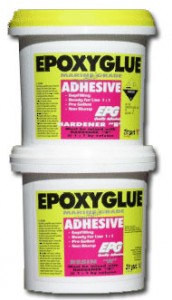Epoxy Glue
 Epoxy glue is not your typical wood glue. One of the main down falls to epoxy is how the user makes their joints. With regular wood glues, tight joints are required and this method is practiced by many competent woodworkers. When it comes to tight clamped joints this will be the epoxies Achilles hill.
Epoxy glue is not your typical wood glue. One of the main down falls to epoxy is how the user makes their joints. With regular wood glues, tight joints are required and this method is practiced by many competent woodworkers. When it comes to tight clamped joints this will be the epoxies Achilles hill.
Epoxies have been used in wooden boat construction with great success in the last 25 years. In fact they have supplemented plastic resin and resorcinol glues for these two main reasons:
- Epoxy glues are for more forgiving in less than perfect working conditions
- The glue does not require tight fitting joints. In fact the joints are stronger when the joints are machined to a loose fit.
When bonding wood with epoxy make sure to stain the wood around the joint first. The epoxy that oozes out will seal the wood around the joint causing no stain to penetrate the wood. When your ready and the joint is ready to be clamped, make sure you do not over-tighten the joint and force all the epoxy out. When gluing just clamp the joint to close it and no more. If your joint will be under load right away, keep it clamped for at least a week. An epoxy joint will get stronger with time.
Epoxy glue is a natural choice for glue when your joints have to hold up to outdoor  conditions, but it must be done right. Even though epoxy has been used in the marine industry for years, it does not mean you can glue some joints on your patio furniture and expect them to hold for years. Even though the epoxy has a very strong joint and very effective moisture resistance you should still encapsulate the wood with an epoxy resin to seal it.
conditions, but it must be done right. Even though epoxy has been used in the marine industry for years, it does not mean you can glue some joints on your patio furniture and expect them to hold for years. Even though the epoxy has a very strong joint and very effective moisture resistance you should still encapsulate the wood with an epoxy resin to seal it.
Wood that is encapsulated with epoxy has a very stable moisture content that hovers around the equilibrium moisture content for the environmental exposure. As well the wood does not experience the dimensional changes that are normally associated with changes in the atmospheric moisture content.
Pros to using epoxy:
- The bond will withstand most solvents when curing is complete.
- Excellent for sealing gaps and will withstand vibration and shock.
- Can be used on pipes, radiators, wood, metal, ceramic tile, china, marble, glass and masonry.
- Since epoxy is toxic and flammable, use extreme caution when handling.
